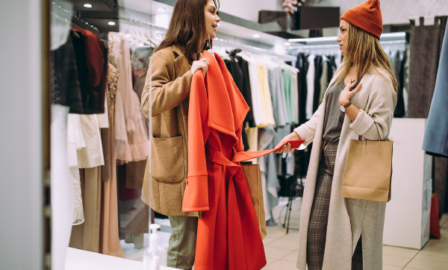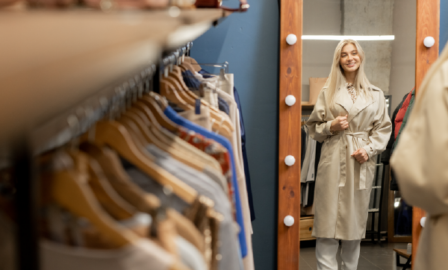Improving the Buying Experience in Online Luxury Retail
Luxury retail has traditionally focused on in-person, intimate selling, with the ability to control consumer experience and provide a personal touch. Recently, Adobe’s Digital Economy Index estimated that online spending will reach between $850 billion to $930 billion this year, with the potential to reach $1 trillion by 2022. Experts have predicted that apparel and accessories eCommerce sales alone will grow by 18.9% once the pandemic ends, with nearly one-third being attribed to online luxury retail by 2025. As online sales continue to rise, it is critical that luxury brands take necessary steps to build their digital presence and enhance consumers’ online buying experience. While embracing this new and growing digital landscape, luxury brands can enhance their consumers’ online experience while still staying true to their image.
Leading Brands in Online Luxury Retail
As of April 2021, Gucci stands as the leading online luxury brand. With over 15% of total search interest, Gucci is followed closely by Chanel with 11% of searches. When considering the two brands respectively, each leverages digital technology in different ways to maintain an elite buying experience for their consumers.
Gucci, a brand the embraces genderless fashion and sustainability, leverages digital storytelling in numerous ways to enhance online presence. Continuing to innovate online, Gucci experiments with digital technologies like Augmented Reality, through their Gucci app and Snapchat try-on features. With shoes remaining one of Gucci’s top-searched products, the brand has taken a cutting-edge path to reach their consumers digitally. In March 2021, Gucci sold the first-ever virtual online-only luxury sneakers, the Gucci Virtual 25. Gucci has spear-headed a new, unprecedented niche in the marketplace that highlights their innovative nature as well as consumer loyalty.
Chanel, an esteemed luxury fashion and beauty brand, is the leading luxury brand across all social media channels. With over 81.4 million followers combined, Chanel understands the importance of maintaining innovation online. In light of the recent pandemic, Chanel continues to step up their digital efforts. In 2020, Chanel took a coronavirus-safe approach to their summer collection, releasing a digital-only video presentation, Balade en Méditerranée. By February 2021, the brand had launched their Lipscanner app, powered by AR and facial recognition. By leveraging digital technologies, Chanel made up for loss of in-person sales but innovating the marketplace.
Building a Relevant Online Buying Experience
For consumers, the buying experience is a massive factor that plays into purchasing from luxury brands. Purchasing from a luxury brand does not just include the product, for many consumers it embodies the high-class service as well. Along with this sense of community, high-end products are often a hefty investment, and consumers want to touch, feel and see first-hand what they are spending their money on. The goal here is to bridge the gap between the in-person experience and online shopping.
With a rise in digital sales, it is crucial that luxury brands enhance their online presence in order to stay ahead of competitors. While building an online buying experience, brands must remain consistent with their overall image and values. In turn, functionality and design behind digital technologies is pivotal to succeed online. Customization, personalization and interaction is also of growing importance for consumers, meaning brands must leverage data and analytics, as well as technologies like AR and AI. As seen with their recent partnership with Google AI, luxury giant LVMH plans to leverage digital technology and boost sales by managing consumer demands, optimizing store inventories, enhancing personalization, and more. Whether it be a 360-degree showroom for consumers to explore or a personal sales associate available via video chat, luxury brands must strengthen their consumers’ entire online experience.
As luxury brands traditionally thrive in the brick-and-mortar space, the opportunity online and in digital sales is on the rise in luxury retail. With luxury brands like Gucci and Chanel taking steps in the right direction, other brands should follow suit by enhancing their digital presence while maintaining their core values. In order to understand, optimize and maintain consumer experience shopping online, a detailed strategy is necessary.
Subscribe to Clarkston's Insights
Contributions by Rachel Ruth



